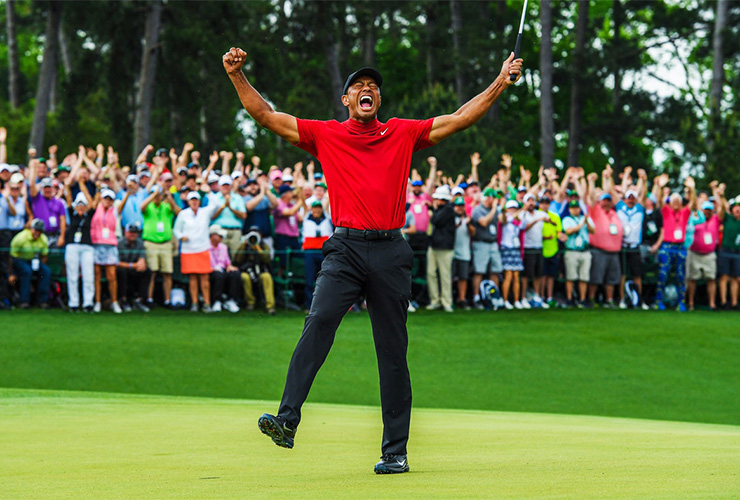By John Huggan, Dave Shedloski and Henni Zuel
Where were you when it happened? Tiger Woods, 43 last April and 11 years removed from his last major-championship victory, turned doubters into believers again by winning his fifth Masters green jacket in the most emotional final day at Augusta National Golf Club since a 46-year-old named Jack Nicklaus won his sixth in 1986. We interviewed 34 of the key figures and observers in the hours, days, weeks and months after Woods’ powerfully poignant triumph. Even those gutted by Woods’ latest magic—and there were a lot of them so close to winning that day—professed feelings of wonder, grateful to have witnessed history. Here are their stories on what went on beyond the roars.
Prologue: The Long Way Back After Surgery
CURTIS STRANGE (on Woods’ spinal-fusion surgery in 2017): The consensus after that was that Tiger would never win another major. But you never say never.
ROCCO MEDIATE (who also has a history of back problems): If he had come back with the same golf swing he had before the injuries, you never would have heard of him again. But I was watching his tournament in the Bahamas, and I watched one swing, and I went, Oh, somebody figured it out. The club isn’t behind him. He’s not up and down as much. All of a sudden, now the back will hold.
PETER KOSTIS: His swing now is constructed to take pressure off his back. He used to control the club with his hands and arms; his body followed that swinging motion. Somewhere around the end of Hank Haney [as Woods’ teacher] and the beginning of Sean Foley, Tiger started to “body” his swing. He got more physical. He generated his arm swing through his body motion, rather than the other way around. And that’s when he lost his way. That’s when he hit a lot of foul balls. Since the last surgery, he has gone back to swinging his arms again. He lets his body accommodate itself to his arm swing. In that way, he was swinging in 2019 the way he swung in 1997, albeit with a different body and effort level.
FRANK NOBILO (CBS): Once the surgery took, he didn’t take as many risks. Go back to the [2018] Open Championship at Carnoustie. Oddly enough, none of us really agreed with his strategy—it appeared too conservative. He was more than a decade removed from winning a major championship. The other guys had watched, and they were a decade better, and they’re all playing aggressively. He just kept plugging away. So I think what he got out of Carnoustie was the fact that that type of golf, as proven in the Nicklaus era, would still work in the heat of the moment.
THOMAS BJORN: I thought the first 27 holes he played on the weekend at Carnoustie were the most telling indications that he was back. I remember thinking, Hang on—I know this guy.
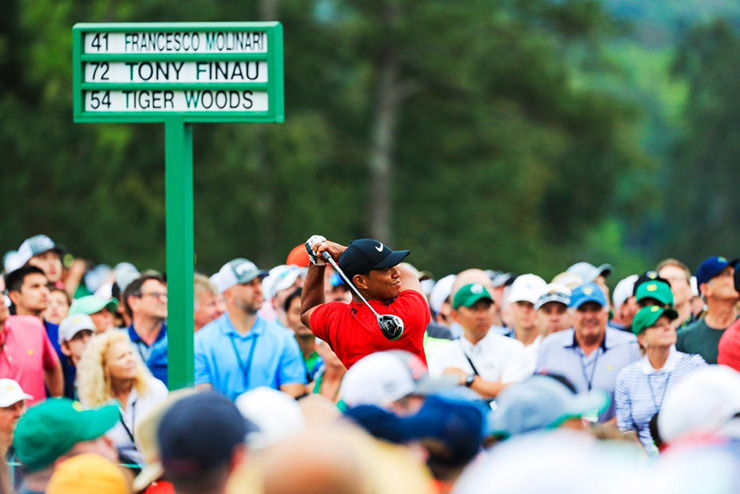
A forecast for rainy weather on Sunday in Augusta prompted a change from two to three players in the final pairing. (Christian Iooss)
ADAM SCOTT: The whole thing was building. He came back. He was swinging the club well. He was contending again. He won the Tour Championship. It was all part of a progression.
JOE LACAVA (Woods’ caddie, on Tiger withdrawing from Arnold Palmer’s tournament in Orlando a month before the Masters): At the time, I was disappointed because I really felt like he hadn’t played enough tournament golf going in.
● ● ●
Woods subsequently played in the Players Championship, finishing T-30, then in the WGC-Dell Match Play, where he advanced from group play, then defeated Rory McIlroy in the round of 16 before being eliminated by Lucas Bjerregaard in the quarterfinals.
● ● ●
JOE LACAVA: Let me tell you something: His weeks are a lot tougher than anybody else’s. He put in so much time in Florida before the Masters—at the house and Medalist [Golf Club]. He worked his butt off. He was 43, not 23.
TIGER WOODS: This stuff is hard.
ROB MCNAMARA (vice president for Woods’ TGR Ventures, on a trip to Augusta National before the tournament that included a round with Jeff Knox, a member who has competed as a marker at the Masters and in 2014 beat McIlroy head-to-head, 70-71): The last few times that the group of us have played together, it’s been Knox and me versus Tiger. We played from the back tees, which, 7,500 yards and my slap cut, it’s way too long. But we’re pretty competitive. Last year, Tiger destroyed us. He shot maybe five or six under on the front and didn’t miss a shot. Knox kept looking at me like, We gotta play better. So that’s obviously a good sign. We saw a little preview in that 65.
TIGER WOODS: My swing had finally turned the corner. I was trying to make sure that I could hit a high draw and call upon it with driver, 3-wood, 5-wood, any club in the bag. I somehow found it.
Low-Key Strategy
JOE LACAVA (on Tiger arriving at Augusta on Sunday and limiting his practice to chipping and putting): I try to leave Tiger alone as much as I possibly can, but I texted him earlier in the week and suggested we do that. Just being out there in peaceful scenery with nobody around, as late as possible on a Sunday. Being able to actually enjoy it a little instead of being out there Monday when you’re grinding and everybody wants a picture, and it’s a complete zoo. I said, “Me, you and Rob, and that’s it. Grab a couple wedges and a putter, whatever.” … You know, typical Tiger, he didn’t text me back.
ROB MCNAMARA: Joe does the same, by the way—there’s no text back from Joe.
MARK STEINBERG (Woods’ agent, and a partner at Excel Sports Management): I could call [Joe] right now and play the voice message: Hey, it’s Joe. Leave a message. If it sounds interesting, I’ll try and get back to you. If not, probably won’t …
JOE LACAVA: Truth hurts.
MARK STEINBERG: I respect that.
JOE LACAVA: Don’t take it personally—that’s with everybody. … So I got a text back. He goes, “I’ll be there Sunday at 2 o’clock waiting to go around the front nine and chip and putt,” like it was his idea. I’m like, “OK, great, perfect.” Anyway, we got a lot of work done that Sunday afternoon [hitting the golf course at about 4:20 p.m.]. It was nice. It turns out, Tuesday was a washout, so it worked out to our advantage.
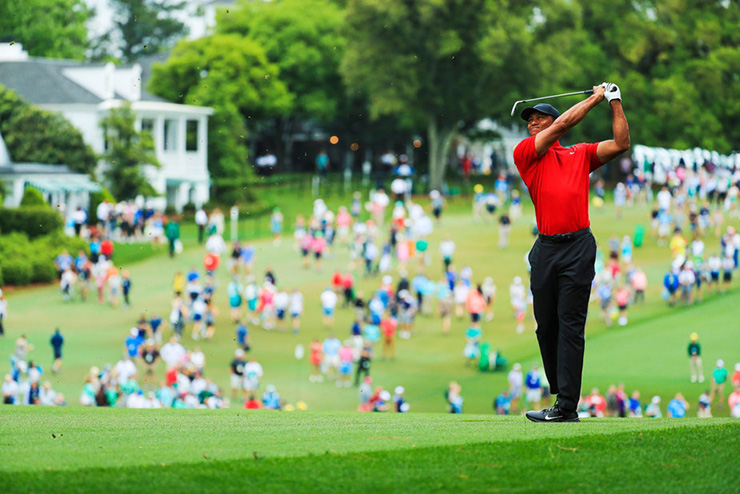
Woods started the final round two strokes back of Molinari. (Christian Iooss)
Foreshadowing A Big Final-Round Putt
TIGER WOODS: The one smart decision I think we really made was on Tuesday, when it just hosed down rain. All the guys who went out and played said it was useless to go out there because it was gonna be so much faster come Thursday. I just did drill work and worked on technique.
JOE LACAVA: Wednesday, we did nine with Fred [Couples] and JT [Justin Thomas]. You might not have heard the story, but the pin on No. 9 [in the final round] was basically out there on Wednesday, the same location. Tiger dropped one on the back of the green [about 70 feet from the hole] and challenged JT to a little putting contest, closest to the pin. So we basically hit the same putt on Wednesday that we did on Sunday. I mean, you can putt that thing off the green. You could leave it up top, which means you’re going to make a 5 or 6. Wednesday, it’s a pretty easy putt. Not on Sunday. You’ve got to barely carry the ridge to trickle it down there, and he did [to within a foot]. Amazing putt, really.
A Good Start
Woods shoots a first-round 70—matching his opening score in three of his four previous Masters wins—and was T-11, trailing co-leaders Bryson DeChambeau and Brooks Koepka by four strokes. The last Masters winner outside the top 10 after the first round had been Woods, who was T-33 and seven strokes behind Chris DiMarco after the opening 18 in 2005.
● ● ●
JOE LACAVA: It’s nice to get off to a good start by hitting that first fairway. It sounds weird—every hole counts just as much as the others. Make a good drive on 1, which might not be his favourite driving hole, and knock it safely on the green. A no-sweat 20-foot two-putt par is kind of nice, you know what I mean? He just had this demeanour about him, but he was still in a mood where he could talk to people and say hello. He wasn’t ignoring people, just a little more focused than he had been.
A Near-Disaster
Woods shoots a second-round 68 and moves up to T-6, trailing co-leaders Koepka, Jason Day, Francesco Molinari, Louis Oosthuizen and Adam Scott by a stroke, but the day has a scary moment: A security guard attempting to keep spectators back at the 14th hole slips on the wet turf and clips Woods’ ankle.
● ● ●
TIGER WOODS: He was just trying to do his job. Look, it was slippery out there. He tried to put the brakes on, and unfortunately my right knee went around my left. And that’s what hurt. It did hurt. My LCL in my right leg, I definitely felt it. But, I gotta go play, so off I went [and birdied the hole]. … You know, when you play in front of a lot of people, things happen.
JOE LACAVA: Friday is a round that could have been better. He birdies 11 [but misses opportunities at 12, 13, 17 and 18]. You know, you’re just happy to be in contention, but I always look at it as we should be better, if not running away with the tournament.
NICK FALDO (CBS): He makes two birdies out of the left trees on 14 on Thursday and Friday, and he [later] makes two pars out of the right trees on 11. Now, you give him four crooked drives, as we know at Bethpage [2019 PGA], and you’re missing the cut. Augusta, he can get away with it.
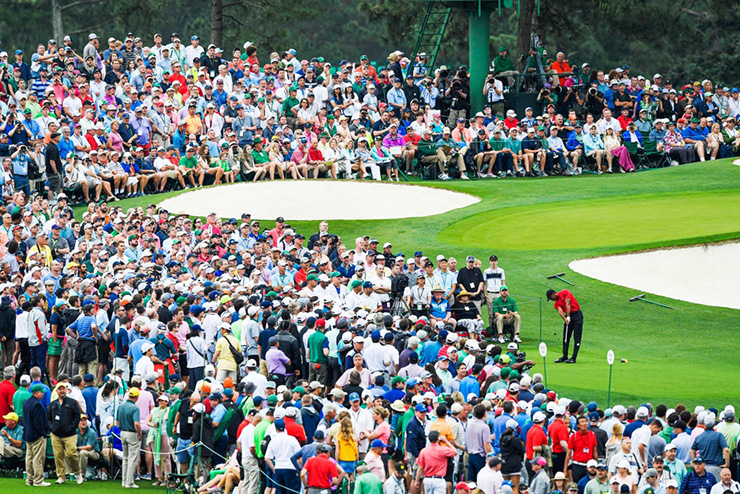
A mass of people follow Tiger as he tees off on the third hole. (J.D. Cuban)
Making A Move
Woods shoots a five-under-par 67 on Saturday, his best round of the tournament, to move into a tie for second with Tony Finau (64), two strokes behind Molinari (66), the leader at 13-under 203.
● ● ●
JOE LACAVA: We can go back to 14, making two birdies from those trees [Thursday and Friday]. That’s like stealing. On Saturday, he came up, hit it right down the fairway, hit it in there not close, whatever, 20 feet, but missed it. I jokingly said we would have been better off in the trees.
FRANK NOBILO: He had a few believers on Thursday, he got a few more on Friday, and by Saturday, a lot more people were starting to believe it.
DUSTIN JOHNSON: As loud as those roars were, it’s kind of hard not to pay attention.
BROOKS KOEPKA: Never heard a Tiger roar that’s not loud.
TIGER WOODS (asked after the round if he still feels pressure): The day I don’t feel pressure is the day I quit. … If you care about something, obviously you’re going to feel pressure.
‘The Perfect Storm’
A rainy forecast necessitates an early start on Sunday. Molinari enters the final 18 leading Woods and Finau by two shots, Koepka by three, and Ian Poulter and Webb Simpson by four. Dustin Johnson, Xander Schauffele, Oosthuizen, Matt Kuchar and Justin Harding are five back.
● ● ●
JOE LACAVA: With the weather moving in, we got a break by going in threesomes on Sunday—otherwise we wouldn’t have been in the last group. The fact that Tiger’s in the last group [with Molinari and Finau], and everyone’s pulling for Tiger, that certainly helped our cause. … People were texting me, going crazy ’cause Tiger said on the air that he had to get up at 3 o’clock to get that tee time. I said, “To be honest with ya, he’s usually awake at 3 or 4 in the morning.” So I’d much prefer to have a tee time at 9 o’clock, because by the time the 3 o’clock in the afternoon tee time comes, which is normally when it is, he’s been up for 12 hours; he’s exhausted almost. Most people sleep till 7 o’clock in the morning. He just doesn’t do that.
NICK FALDO: It was the perfect storm for Tiger. It really was. Jim [Nantz] asked me Sunday morning, “So what’s going to happen?” I said, “I think Tiger’s going to win.” Before we went on the air. I’ve never seen the patrons go from 10 deep to 12, to 15, to 20 deep, and he hadn’t arrived yet.
PADRAIG HARRINGTON: Sitting in the clubhouse, we knew he was coming 15 minutes before he appeared. The security started to get ready. And people lined up just to see him walk past. Then he arrived and made his way through the crowd. Everyone stepped out of his way. He had his head down. He made eye contact with nobody. And he smiled at nobody. He was the old Tiger.
MARK STEINBERG: I couldn’t breathe all day. … That’s as nervous as I’ve been. His mother, Tida, texted me, like, “You OK?” And I was so frickin’ far from OK. … I think I threw up twice in the first six holes.
JOE LACAVA: The warm-up looks great. His kids [daughter Sam and son Charlie] are coming in; I know he’s pumped about that. He doesn’t need to be more motivated, but I know he wants to win in front of his kids. The only thing I thought was a bummer: I went out to try to get some pins [locations] like all of us do on tournament week there. I went out there at 6, 6:30, and nothing’s going on. Guys were out there, the lights were on, but they had just started [to cut the pins]. I could have done them all, but I would have been back at 9 for his 9:20 tee time. I had to be back at the clubhouse by 7, so I couldn’t give him a whole lot of knowledge before the round, but he understood.
NICK FALDO: As he walked off the first green, I said, “You know what, if he plays this like running the marathon … ” It doesn’t matter how good you’re playing, how confident you are, there’s that history and aura of the back nine of Augusta. If things are going to tighten up, you can’t stop it—it’s almost like a flood.
JOE LACAVA (on Woods bogeying the par-4 fifth hole all four days; on Sunday he parred the first and second, then birdied the third before bogeying the fourth and fifth): I’m thinking, What the … what do I gotta do here? Going to 6, I said something briefly, basically saying, “You know, it’s one thing if you don’t win this tournament today, but just don’t hand strokes to people.”
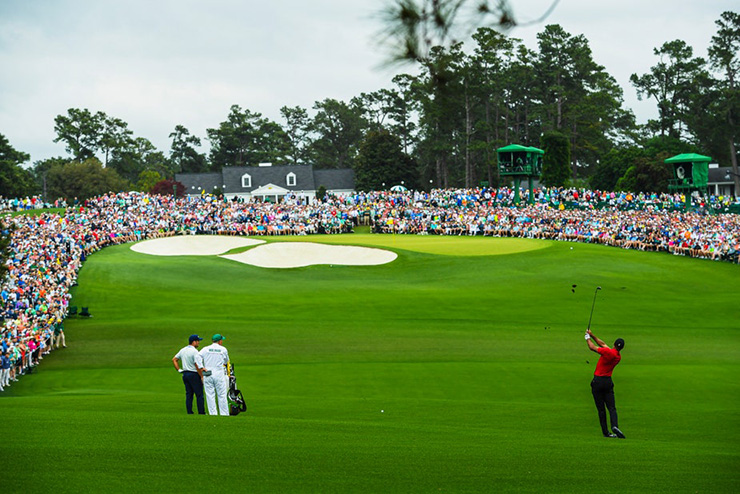
Woods hits his approach shot on the ninth hole, where he will make a crucial two-putt from 70 feet on Sunday. (J.D. Cuban)
TIGER WOODS: The talk that Joey and I had off of 5—I just listened. He was saying some things that I can’t really repeat here. Then I went into the restroom and proceeded to say the same things over and over to myself, and then came out, and I felt a lot better.
MARK STEINBERG: Joe is an incredibly calming influence on Tiger. Not just on the golf course, but in life.
ROB MCNAMARA: Overdoing it with Tiger is the wrong thing.
MARK STEINBERG: That’s a bad thing.
ROB MCNAMARA: If you over-caddie, if you over-coach, if you overdo anything, it’s off-putting for him.
MARK STEINBERG: Then you look for a new job!
JOE LACAVA: He hit a good 8-iron on 6 to probably 12 feet but didn’t make the putt.
TONY FINAU: I started watching the Masters in ’97 [Tiger’s first major victory], so now to be able to play against my idol in the final group at Augusta National was something special. We get to hole 7, we haven’t exchanged any words, nothing, just saying good luck on the first tee was about the extent of our talking. … I’m walking off the tee, we’re right next to each other, so I figured I better say “Hi” or say something to him. I said, “Hey, Tiger, how’s the family? How’s the kids?” And he looked at me pretty straight-faced, and he said, “They’re good.” And he kept walking, and I never talked to him again until I was congratulating him on the 18th green. He was all business. … Rightfully so. [Laughs.]
FRANCESCO MOLINARI: There was not a lot of chatter.
RICH BEEM (Sky Sports): He’s the toughest bastard who ever played the game. All that talk about him becoming more relaxed needs to be taken with a huge pinch of salt.
JOE LACAVA: On 7, Tiger hits it to a foot to birdie it, then birdies 8 [matching Molinari, who had a one-stroke lead after making a 5 at No. 7, his first bogey in 50 holes].
NICK FALDO (on Tiger’s two-putt par from the back of the green at 9): He was keeping the round going. Molinari hadn’t missed a putt, but Tiger kept in contact [making the turn one shot behind Molinari before a bogey at the 10th dropped him two off the lead].
The Drama Builds Before Four Key Splashes
JIM NANTZ: There are two tee shots that Tiger struggles with at Augusta above all: No. 1 and No. 11. But it’s uncanny how many times he’s been able to work his way out of a jam at 11. The par at 11 was a pivotal moment in a lot of ways. He could have been stepping up on the 12th tee off of consecutive bogeys, and the atmosphere might have been completely different.
FRANK NOBILO: Eleven, he could have easily made bogey or worse.
JOE LACAVA: You’re coming down the hill at 11, and you’re always watching over there [at the 12th], and I see Poulter and Brooks drop [after hitting into the water]. And Brooks is the hottest player in the world, so I’m guessing he didn’t mis-hit a shot. That tells me something tricky’s going on with the wind. Then I see Webb is over the green. You always pay attention to that hole, but now it’s really got my attention. Tiger is paying attention—he knows what’s going on.
TIGER WOODS: It’s like, OK, there might be something there. I could see some of the water ripples.
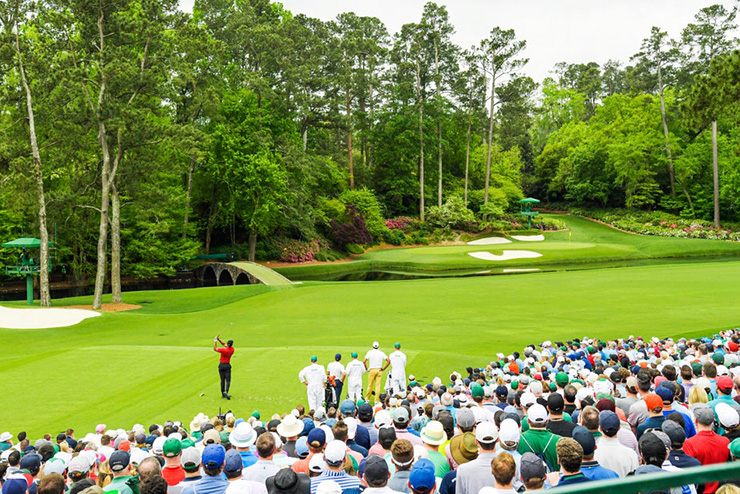
Four of the final six players found water at the 12th hole, but Woods hit the green for another key par. (Dom Furore)
FRANK NOBILO (CBS announcer at the 12th): It wasn’t like it was blowing strong, but it blows enough. Every year those trees get taller. The angle of that green on the right side, it’s a longer carry. Invariably, all the players got caught doing the same thing.
GRAEME MCDOWELL: I was on Twitter having a bit of banter. I put up a Google map to show the wind direction—12 was playing into the wind. It was amazing to see how many guys got it wrong.
KEN BROWN (BBC): The pin position [in the final round] is normally four yards from the right edge. Last year, it was three. That might have led to a misconception among some players.
IAN POULTER: The only thing I can say about my tee shot at the 12th is that I wouldn’t want it back. I thought it was perfect.
BROOKS KOEPKA: Four out of six guys just don’t hit it in the water because of pressure. The wind switched completely on us. I actually backed off because the wind kind of went down, and I should have hit it, because it would have gone to the middle of the green. … The wind can kind of make you look stupid on that hole.
FRANK NOBILO: That breeze is sometimes like a brick wall. I’m not trying to give him a pass here, either. It just stood up in the breeze. Wow, that happens. I’ve seen it where guys airmail the whole green because you hit it a little bit farther left or something like that and the wind doesn’t touch it, and you’re up in the weeds in the back, up by those pines. Also, the guys hit it a little higher with the way the ball and equipment work. I don’t know another place where you have to hit that sort of shot. I thought Koepka hit the 9-iron pretty solid. But yeah, it was a mistake.
JOE LACAVA: Then Molinari gets up there, and he didn’t quite catch it. I tell people this all the time, regardless if he caught it or not: It’s hard to watch a guy hit it in the water with one less club than you plan on hitting, and you’ve got to follow it.
FRANCESCO MOLINARI: Bad execution. We picked the right shot and didn’t hit it hard enough, as simple as that. I was trying to hit a chippy 8-iron. It was probably a 9-iron yardage, but I didn’t want the wind to gust and to get the ball too much. Just pushed it a bit, and necked it a bit. If it’s one yard farther left, it probably goes in the bunker.
PADRAIG HARRINGTON: I didn’t see Frankie making such a colossal error on the 12th. When you’re leading the tournament, you don’t hit right of the bunker. It doesn’t matter how confident you are.
FRANK NOBILO: It was probably the worst swing Molinari made in, I don’t know, 18 months.
JACK NICKLAUS (who was watching from Belize, where he had been fishing): The guys started filling up Rae’s Creek on the 12th hole. I’m watching them one after another hit the ball right of the bunker, and I said, “Really?” You just can’t hit the ball right of the bunker. How many times have you seen the tournament lost because they hit it right of the bunker?
TONY FINAU: Frankie didn’t make a mistake all day until 12, and when he did that, it was time for me and Tiger to capitalize. Tiger did, and I didn’t.
GRAEME MCDOWELL: It was interesting how they all made mistakes. It might be overstating things a bit, but Tiger’s presence was probably part of that. He was relentless.
KEN BROWN: Ruthlessly professional.
NICK FALDO: Obviously, 12, everybody was twitched up, and Tiger was nervy. I’m screaming, “Just do what Jack did, over the middle,” and he did that.
FRANK NOBILO: Woods got up there, and he didn’t take the bait, just pushed it another hole. You never take the shot on until you really have to.
TIGER WOODS: My whole game plan was to put it over the tongue of the bunker on 12. I was committed to hitting it on my spot. I just happened to draw it up against that wind a little bit more than I wanted to, so I thought it was going to probably be six or eight feet past to where it was, and it basically just got on the green. And so I said, Ah, that’s why Brooks and Poults ended up short. There’s a little more wind into you than there is more cross. And then Tony hit a good shot. You could see it get killed at the end. It stalled out. That’s all it takes, and it ended up short, in the water.
TONY FINAU: I hit a 9-iron 165 yards, perfect club in there, a little chip/cut 9. The number, I think, was right in between all of our clubs.
JOE LACAVA: I hear Tiger talk about this: Whatever you’re going to hit, commit to it, and just try to hit it solid—you’re better off versus trying to fit something in there. And Tiger’s went enough to basically get that thing 35 feet left. [After the drop], Molinari’s got like a 14-footer [for bogey], and Tiger had about a five- or six-footer [for par]. In my mind, Molinari’s going to make this and we’re going to miss and have the same fricking score? Come on. But Molinari misses.
FRANK NOBILO: Tiger’s six-footer was amazing. It’s the slowest putt; if it lacks pace, it turns quickly, and invariably people miss it on the bottom edge. So the six-footer was hit with the right pace. It was vintage Woods. There was nothing timid about it.
JOE LACAVA: Last group, the greens aren’t chopped up, but they’re not smooth. It’s a left-to-righter. You know, it’s not as crusty as it’s been in years past, but it’s not much fun. But that’s part of what playing in the last group is.
JIM NANTZ: It’s impossible to believe you could have that many guys at peak form contending for the green jacket who would make the same mistake. I began to think, This is going to be Tiger’s day.
GRAEME MCDOWELL: The way Tiger played 12 summed up how he won 15 majors: He does what you’re supposed to do. He was just so unbelievably disciplined. He just waited and let everyone else make mistakes.
NICK FALDO: It’s like the highlight reel of the last 40 years of things going wrong. Those guys make a mess of 12. Tiger had hung with them and then basically outplayed them for those last six, seven holes.
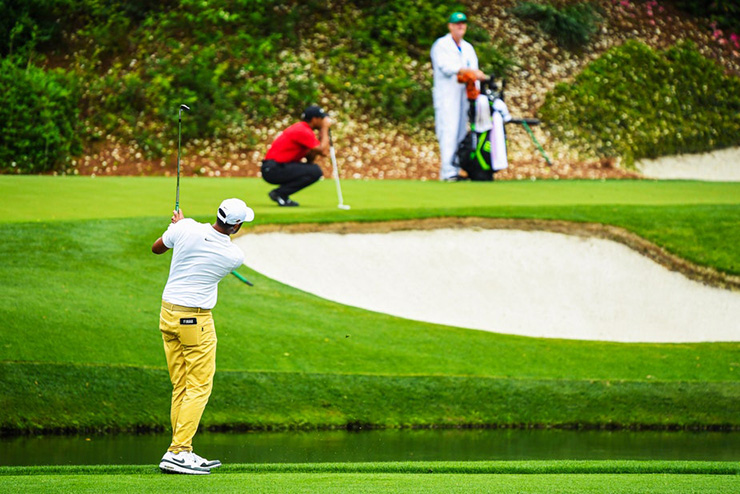
More drama at 12: “It was time for me and Tiger to capitalize,” said Tony Finau. “Tiger did, and I didn’t.” (J.D. Cuban)
‘At Least Seven With A Legitimate Chance To Win’
TIGER WOODS: All of a sudden it seems like there are four guys tied for the lead. You know, Brooks makes an eagle [at 13]. I make birdie. Francesco makes birdie. I think [Patrick] Cantlay had just made something up ahead of us [an eagle at 15]. DJ’s making a run. Bubba just got to 10 [under par] quickly. And so it went from a one-horse race with all of us kind of chasing Francesco. There are at least seven with a legitimate chance to win the tournament. I’m like, OK, the next board I see is not until 15. So, I get a good understanding, see where they all are, look at what holes they’re on in case I hear any roars, who that might be.
JOE LACAVA [on Woods’ two-putt birdie at the par-5 13th]: I looked up, and Cantlay had the lead. Well, I can do the math. I know he’s already played 13, 14, 15. We had 8-iron in there at 13, [161 yards], a beautiful 8-iron, pin-high left, which is exactly where you’re trying to hit it. No need to go at it. He’s obviously smarter; he’s been there.
PATRICK CANTLAY (after his eagle at 15): I knew those guys behind me had all the easy holes to play, but I felt like if I could play the last three holes one under par that I’d either win or be in a playoff. [Cantlay bogeyed 16 and 17 and finished three back.]
PADRAIG HARRINGTON: Tiger was a different person over the last five holes—he was the Tiger I used to know. His instincts took over. He forgot all about his swing and how it was feeling. He was playing golf. All he did was hit the shots that made winning most likely. He hit a cut off the 14th tee. He did the same on the 15th, a hole where the temptation is to try for a big drive. He was pragmatic. Gone was the guy trying to hit shots just to show the world he could hit them. He was just trying to get the ball in the hole. Aesthetics went out of the window.
JOE LACAVA: Fourteen, not a very difficult putt, but never had a chance. I’ve got no problem making par, but when you hit it there, I’m thinking, Let’s not give anybody a chance. But he’s smart; he doesn’t want to hit it three feet by. Fifteen, great drive down the right. Five-iron from 227. Not an easy two putt, but got it down [for the lead at 13 under].
CURTIS STRANGE: I watched the last round in my hotel room. I had finished my television duties earlier. [Wife] Sarah was rooting for Molinari because he’s such a nice-looking young man. [Laughs.] She was almost crying when he hit into the water on 15.
FRANCESCO MOLINARI (on making a double bogey at 15): Not a very good swing off the tee. If I had the chance to hit another shot again, it probably would be the lay-up. Trying to go for the flag from the left side [on the third shot], it was obviously close to the branches of the tree, and we never know, if it doesn’t clip the branch, it might go close to the hole. But I probably should have gone middle of the green and just wait for the last three holes to try to make something happen. … When I look back, the biggest swing was 15, really, more than 12. Even if you go through 12 two shots ahead, you have two par 5s coming the next few holes. Anything can happen.
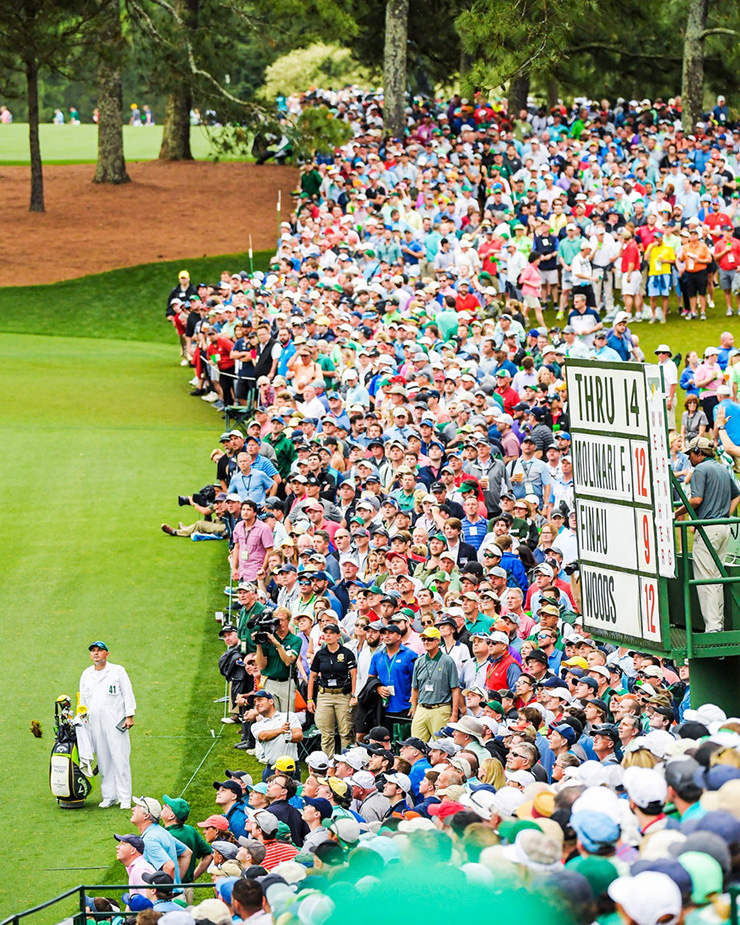
Francesco Molinari made a double bogey at the par-5 15th after his third shot clipped a tree and found water. (Dom Furore)
PETER KOSTIS: For the longest time, it seems like Tiger got every break in the book. If he hit a tee shot earlier in his career, he would always get a lie or have a swing if he was off line. Then he would pull off the shot and make a par or a birdie. Subsequent to the scandal, he lost that mojo. He walked into the woods or the rough with his head down. The body language had changed. But my thought at Augusta was, Wow, he’s got it back. The breaks were back. On the 15th hole, Molinari’s third shot hit a pine cone and fell into the pond. Tiger’s second shot at 18 also hit a pine cone, but the ball dropped in front of the green in a spot where he could get up and down. It could have gone anywhere, way to the right in the trees, unplayable—whatever. He could have made a big number had the bounce not gone his way. Now, you need good breaks to win anywhere, but I thought he was back in every way possible: physically, emotionally and spiritually.
‘He Made It Impossible For Them To Knock Him Out’
CURTIS STRANGE: When Tiger got to the lead, he played phenomenally well thereafter. It was an education. He played to the proper parts of the greens. He might have been a little more aggressive back in the day, but what he did was brilliant. He showed everyone else how to do it.
TIGER WOODS: Conservative when needed, and aggressive when allowed.
KEN BROWN: To use a boxing analogy, Tiger had his opponents on the ropes, but he knew he wasn’t going to knock them out. So, knowing he was ahead on points, he made it impossible for them to knock him out. He kept them at a distance, something you have to be so skillful to achieve—especially when it means so much to you.
TIGER WOODS: Missed the ball in the correct spots time and time and time again, and if I was out of position, so be it, take my bogey and move on. I had no doubles [for the week]. … Just kept plodding.
NICK DOUGHERTY (Sky Sports): I was blown away by the fact that he has found a different way to be a superstar. He used to hit shots that you thought no one else could hit. But this was the opposite. There was nothing that special—he shot 70—so there were no “What about that?” moments. He just outlasted everyone. They all faltered except him. Tiger was the guy who didn’t hit the bad shot at the time you couldn’t hit the bad shot.
JOE LACAVA (on Woods’ birdie at the par-3 16th, after almost making a hole-in-one with an 8-iron): It was never going to be a 7-iron, because a 7-iron, you’re cutting it. There’s more of a chance you’re going to leave it up on the right side, which is no bueno. But he hit a gorgeous shot, probably drew seven yards and went exactly where you’re looking. I understand a lot of guys do it on Sunday, but not in the last group knowing you can make 2 but knowing you’ve still got to be aggressive. Huge shot. The crowd stands up, and I’m thinking, Just be a kick-in. I thought it was a foot the way they reacted, but they’re jacked up, and it’s 2½, maybe three feet. No gimme. It’s below the hole, which is nice. He even asked me to take a look at this one. I thought, OK, I don’t need to go over there. I know on Thursday or Friday this is a left-centre putt because it’s going to break a little to the right. But on Sunday, in my mind, I don’t want you to allow this thing to break. So I said, “Just knock it right in the back in the middle; nothing there.” Meaning, don’t even give it a chance to break, because sometimes you can think it’s breaking, pull it a little bit more. You don’t put as good a stroke on it for whatever reason.
VERNE LUNDQUIST (CBS announcer at the 16th, after the birdie and earlier aces by DeChambeau and Justin Thomas): I’m compelled to say … Oh … my … goodness.
NICK FALDO: I actually did a piece, but we didn’t run it, on how you’ve got to make 2 at 16. You look at how many times when somebody’s won, they’ve made a 2 at 16. Sure enough, bang.
BROOKS KOEPKA: That basically won him the tournament right there.
TIGER WOODS: That gave me the cush [a two-stroke cushion after his sixth birdie of the day].
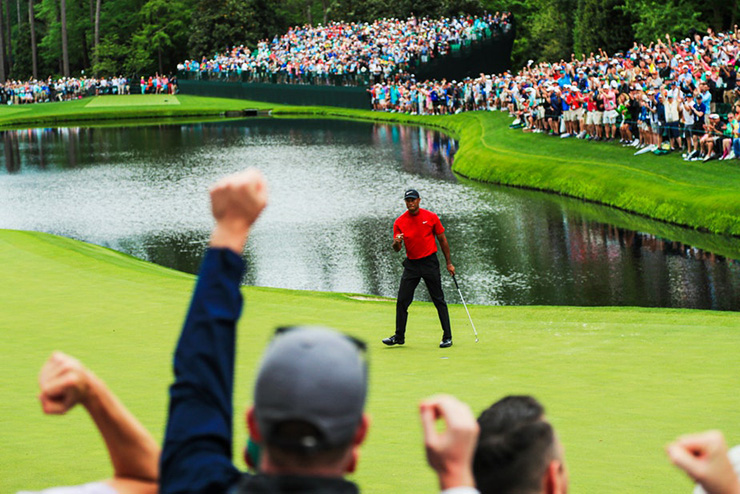
Woods increases his lead to two strokes with a short birdie putt after almost acing the par-3 16th. (Christian Iooss)
JIM NANTZ: You know, he didn’t end up magically holing 150 feet worth of putts. No, no, it was a workmanlike, outthinking-your-competition kind of a performance.
DUSTIN JOHNSON (who birdied four of the last six holes but missed a birdie putt at the 18th that would have cut Woods’ lead to one): I figured if I birdied 18, I would probably get into a playoff. It was 14 feet maybe, straight up the hill. It just burned the right edge.
TIGER WOODS: As I’m walking to 17, I said, I’ve been here before. In 2005, I chipped in [at 16], grabbed the two-shot lead and screwed up. I went bogey/bogey and was fortunate enough to beat DiMarco in a playoff. Well, not this time. Let’s go ahead and get committed on this tee shot. Let’s pipe this tee shot down here.
JOE LACAVA: He hit maybe the best drive of the week. Again, probably not his favourite driving hole. I think it was actually easier with the Eisenhower tree there [on the left side]. I don’t know if it was an aiming point or just kind of going over it, gave you something to look at. But he hit this BB. I’m telling you, it cut a yard, and it was tomahawked. We got up there, and we were a yard past Tony, which we hadn’t been all day.
TIGER WOODS: I hit one of the hottest cuts I hit all week. I mean, I hammered this thing, and it was right up the middle of the fairway. Then a simple 8-iron up on the green, and I took one last look at the board. And at that time it was basically only Brooks. He really has a legit chance to make things a little more interesting. So I try to make my putt there at 17. But the wind’s coming off my left, and it starts to howl a little bit. So I adjusted my line a little bit by another ball because I thought the wind’s going to blow down the hill. It never blew, and went past the hole. I was like, OK, I should have just backed off the putt, but I didn’t.
JIM NANTZ: As he stood on the tee at 18, I assumed he was going to win. I didn’t see a 6 coming.
TIGER WOODS: Going up 18, there are a couple of different scenarios that could happen here. Brooks could make birdie—that puts me with a one-shot lead—or I can make a mistake. Well, if I make par, he’s got to hole out. So let’s focus on putting this ball in the fairway. What can I get in a fairway here? Well, driver I hit in the left bunker there one day, and it’s like 298, but I’m amped up, the wind’s down off the right, and so if I hit driver, which I wanted to do, it brings the bunker into play, where now I have to cut it. Now 3-wood, I don’t have to cut it—I can hit a straight ball, I can hit a draw ball, I can get a cut—I can hit whatever I want; it’s not going to get to the bunker. Fine, I hit it down there, and then I didn’t hear any roars up ahead of me. Then when I got past the corner, I was able to see up on the 18th green. Brooks had a tap-in putt, so that must have been for par. I knew that bogey wins the tournament.
BROOKS KOEPKA (on missing an eight-foot birdie putt at 18): Poults’ putt kind of fooled me. … It’s a new green. I watched it and tried to play it straight and firm, and mine decided to break.
JIM NANTZ: After Dustin and Brooks missed their opportunities on the 72nd hole, at that point it was all setting up for that historic celebration.
Preparing For A Coronation
TREVOR IMMELMAN (2008 Masters champion): I felt like it was history being made. My 13-year-old son followed me around that day. We went up to the Champions Locker Room when I was done, and I’ve never seen the place that full. Everyone was huddled around the televisions. There were no seats free. I was at the back of the room when my son said, “Let’s go down there.” It was a bit like your favorite team wins something after years of failure. It’s like you live part of their life, all the ups and downs.
BUBBA WATSON: I was pretty disappointed coming off the golf course because I bogeyed the last two holes. I’d been only one off the lead. I finished pretty early, but sitting upstairs with some of the other guys, we weren’t going anywhere. He’s finishing up, and I said, “We’re going down there.” And they’re like, “What do you mean?” I’m like, “Guys, it’s Tiger Woods. It’s history in the making.” He wasn’t even supposed to be playing anymore a couple of years ago, and here he is about to win the Masters.
NICK FALDO: If Brooks had holed that putt at 18, then it would have been a whole different thing for Tiger. That fairway on 18 slopes right to left, but there’s a gully down the right, I noticed, where if you hit it a bit too far down the right, it kicks to the right. He hit it right into that gully, so he was then blocked, and seriously blocked. When you don’t have great options, you don’t really want it in the front-left bunker for that front pin.
TIGER WOODS: And I had a little bit of mud on my golf ball playing that shot.
JOE LACAVA: That was a pin that I had never seen before. I think what happened was, nobody guessed to practice to that hole location. He knew he always had to be right, preferably short, or worst-case scenario, pin-high in the bunker, and it was blowing right to left down. It was one of those things where if he just hit a straight ball that would have missed left, it would have been up in the crowd where it was muddy, and from there you can make 6, 7, 8. You can chuck it down the valley, you can skull it. I mean, a million things could happen. Or if you happen to pull it, it’s going to go over that crowd because that was the kind of number that we had. So for him to hit 8-iron, he really had to hit a slice, and I think as he’s coming down, he hit this thing so high. That’s why as the crow flies it only went a hundred whatever, 25, 30 yards. It was basically done on purpose. Yeah, would he have liked to get a little more on the ball and get closer? Of course.
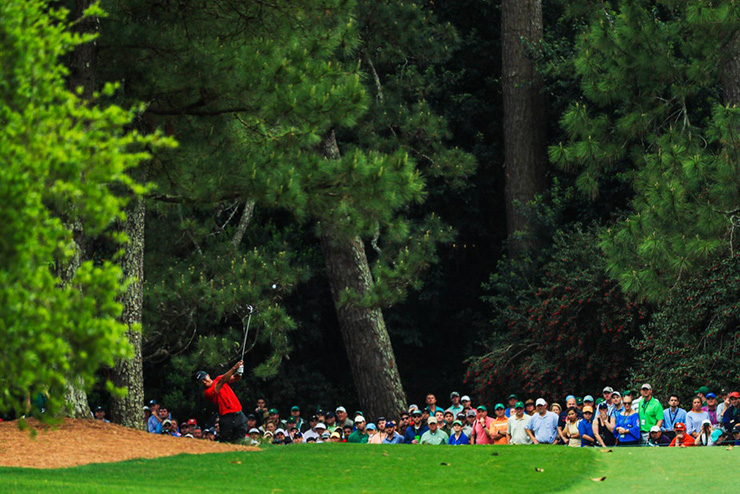
Needing only a bogey at the 18th to win, Woods had to contend with some tree trouble and mud on his ball. (Christian Iooss)
Family Time
JIM NANTZ: Here’s what I remember about Tiger when he was talking to Joe and strategizing about how he was gonna play his second shot at 18. Steve Milton, our director, found the family shot—from one of his cameras behind the 18th green—and he cut to it. And the instant I saw that, I thought of ’97 [Woods’ first Masters win, with a hug from his father, Earl, behind the 18th green]. We’re now going to have something that will bring some symmetry to what happened with his father a generation ago. It was at about that point where I talked about the emotion that came pouring out of Tiger when he won in 2006 at Hoylake, his first major win since his father passed in May of ’06. And I drew a comparison to the raw emotion that was there that day and what I anticipate could be coming up in a matter of minutes. I saw the shot of the family, and I saw the kids, and my instincts told me that this win had so much to do with a father connecting with his children and trying to show his kids the man that their father really is: This is what I looked like back in my heyday.
JOE LACAVA: Nothing’s routine at that point, but he hit a chip, exactly where he wanted to. People always ask me, “When do you think he won it?” And I say, believe it or not, when he had that par putt of eight or nine feet above the hole … and then it has a little too much speed. I see him give—he never does this—the knee kick to try to coax it in. I’m thinking, Why of all the times is he trying to make a putt when he doesn’t have to? Then I thought, Well, he realized he’s hit it too hard, and he doesn’t want a two-footer coming back. But I’m so far up on the hill, I think it’s a little longer than it is. So I’m thinking, Let’s make this thing and get the hell out of here. You still had to wait for it.
TIGER WOODS: That green is different—they redid the green, and [the putt] hung. Had a little 18-inch tap-in. … And there it was.
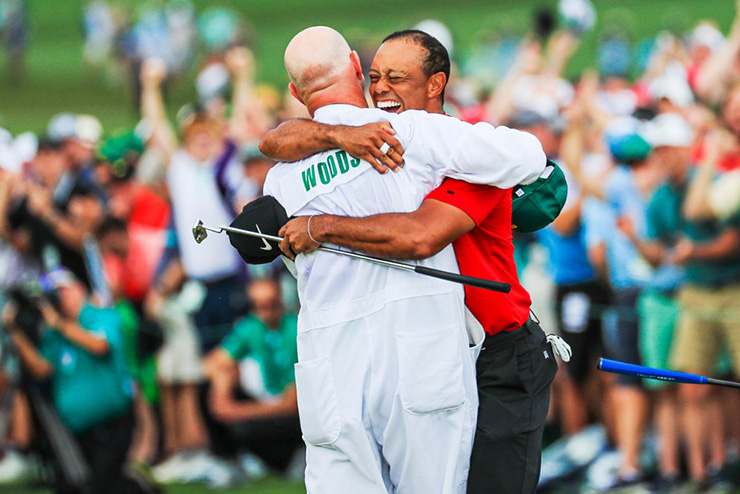
A bogey on the 18th didn’t dampen Woods celebration with Joe LaCava. (Christian Iooss)
The Celebration
JOE LACAVA: Of course I’m happy that he said, “We did it!” and he considers me a big part of the team. How can you not like that? But he deserves all the credit.
TIGER WOODS: One of most loyal human beings you’ll ever meet.
BUBBA WATSON: Name the greats of any sport, and you wish you were there to see them do something amazing. This was Tiger, and we were there, and it’s our sport. I was really grateful to see it in person.
RICH BEEM: He truly wanted to share that moment with his kids as he walked off 18. It wasn’t what you see almost every week when the kids run onto the green. He was doing the running.
GRAEME MCDOWELL: It would have brought a tear to a glass eye.
ROB MCNAMARA: I was trying to kind of tell Charlie and Sam, like, “You can’t run at Augusta and, you know, go on the green.” And they were really good and hanging close, and then as soon as Tiger got a little bit in eye shot, Charlie just took off. And that to me was the best part, just to see him take off, without me saying anything, it was like, bang, and that was awesome.
TIGER WOODS: I think they gained an appreciation for the moment because they were there when I failed. I had a chance to win the last time they came out—I had a chance to win the Open Championship, and they felt the buzz of Dad’s on top of the board. And I lost, and that sucked. But now they saw me on top of the board, and I accomplished it. … I hope that’s something they will never forget.
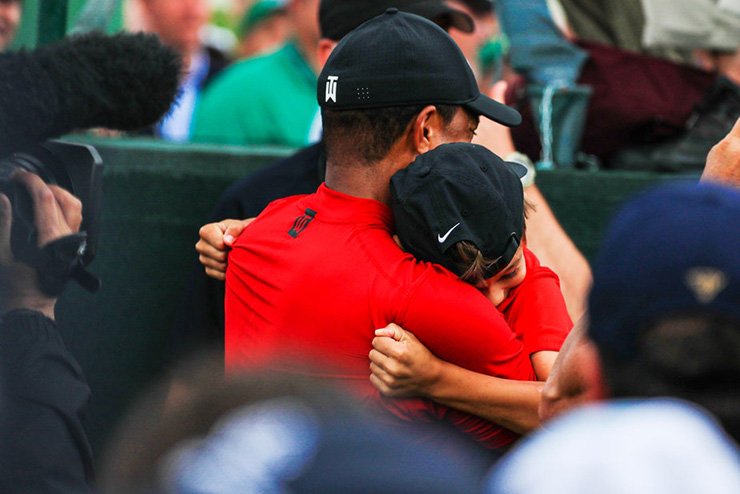
Twenty-two years after getting a Masters hug from his father, Earl, Tiger reciprocates with son Charlie. (Christian Iooss)
MARK STEINBERG: Coming down the stretch, I felt like he was feeling this would be equally, if not more, important for his kids to witness this in person, than it was for him. That’s when I broke down. I was pathetic, I was awful. … You know, being there when he hugged Earl and then Tida [in 1997], and then seeing this. … More emotional than I ever thought I would ever be.
TIGER WOODS: Very similar to what it was like in 1997, and that took me years to understand what I accomplished. … My mom is a rock.
TREVOR IMMELMAN: People were lined 15 deep on the walkway from the 18th green to the scoring area. I’ve never seen such a look on his face. The relief. And disbelief. It had started kicking in that he had won and had disproved the 98 per cent who said he would never win another major again. The greatest athletes all compete with chips on their shoulders. Sometimes they’re real; sometimes they make it up. But they find a way to be pissed off about something. It creates a fire in them and gives them extra power, extra energy and extra mental toughness. Tiger is one of those guys.
CURTIS STRANGE: The most special moment was when he left his family and walked through the gallery from the 18th green to the clubhouse. He was so excited. He was pumping his fists. He was screaming. He was high-fiving everybody. That was the first time I had ever seen him do that. Which showed me how much winning meant to him. And that was all I needed to see. This meant more to him than we could ever know. He clearly had the same doubts we all had.
TIGER WOODS: There was a pretty good period there where I never thought I’d play golf again. And I was just hoping to be able to walk without pain, to be able to live without the feelings that I had going down my leg. I said, “This is what the rest of my life is going to be like? I mean, this is gonna suck.” Now I don’t have any of that nerve pain. I’m stiff as hell, yes. I waddle like a duck at times, but it’s not painful. It’s just achy, and I can deal with achiness.
JIM NANTZ: We see less than 1 per cent of a person’s life when they’re out there on display playing in a tournament. Tiger has a life, and we’re not supposed to know everything that goes on in someone’s life. But you know, you hear things when you’re out on tour for years about how dedicated he’s been as a dad, being there for his kids, how important it is to spend time with them at soccer games and practices, school pickups and drop-offs and all of that. We don’t see it. We’re not supposed to see it. We don’t have to see it. So what I saw on that shot [of his family] is, I thought, Good for him, for his glory in his life at a personal level. People always ask me, where did you come up with this line or that line. In this case, The return to glory, to me, it felt right when it left my lips.
TIGER WOODS: Everyone is dealt cards in their life and obstacles that we all have to overcome. Know that this is all not done alone. I’ve had a fantastic group of people around me, and their love and support has helped. Then having the kids and their love. I’ve tried to explain this over the years … they never knew golf to be a good thing in my life, and the only thing they remember is that it brought this incredible amount of pain to their dad, and they don’t want to ever see their dad in pain. And so to now have them see this side of it, the side that I’ve experienced for so many years of my life, it feels good.
THOMAS BJORN: For the young players today, it was a graphic illustration of what they had only heard about in stories.
XANDER SCHAUFFELE (temporarily held the lead and finished T-2 with Koepka and Dustin Johnson after a final-round 68): I did have my 30 seconds in the sun with the lead, and it was a really cool feeling. … It was a throwback, seeing Tiger in red in the mock turtleneck. It’s what I saw as a kid, and it was just really cool to know him a little bit now.
TIGER WOODS: I thought it was a pretty neat look back in the day. [Laughs.] I was probably in a little better shape back in those days.
ADAM SCOTT: It’s very hard for the younger players on tour to comprehend the level Tiger was at, compared to everyone else. He was so much better—in every department. And there isn’t that separation now. Brooks has to do what he’s doing for another 10 years to come close. I’m not sure I see him doing that. There is no one intimidating the others like Tiger did. I was a hot young player back then. I had dreams. But the reality was that I wasn’t even close. And I couldn’t figure out how to get that good. I know Tiger didn’t win every major, but I felt like my dreams were unattainable because of him. He was such a huge hurdle.
RICH BEEM: All the young kids who wanted to see Tiger at his best? Madness. No you don’t.
THOMAS BJORN: It wasn’t the golf, which was nothing like 2000—it was his mind. But it was all about him getting into position. When he got there, he recognized himself.
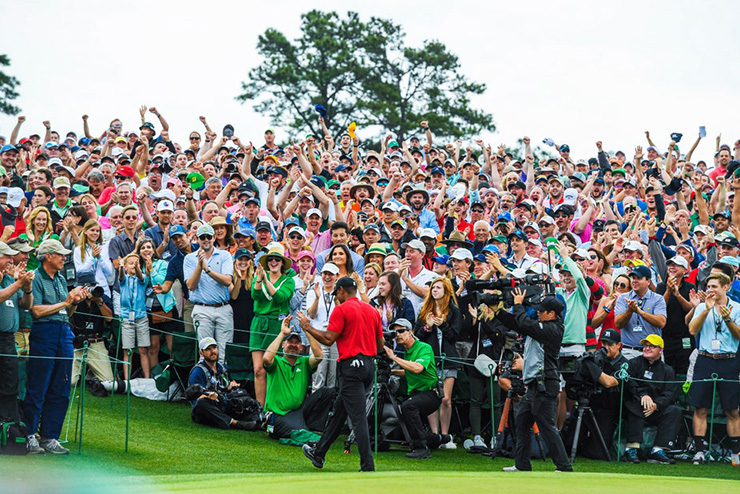
A grateful Tiger waves to the patrons behind the 18th hole. (J.D. Cuban)
JIM NANTZ: In my 34 years of broadcasting the Masters and the NFL and college basketball, I thought it was the most riveting story that I’ve ever had a chance to document.
FRANK NOBILO: I know Nicklaus did it in ’86. It was like a dream, because we were talking about it at the start of the week: Could this be our generation’s 1986? So it was almost like too good a story to happen. But it happened.
PAUL AZINGER: It’s as big as Jack in ’86. Or bigger. It was off the charts.
TIGER WOODS: That’s for everyone else to decide. … I can tell you that ’86 meant a lot to me because that was the first memory that I have of the Masters, seeing Jack celebrate.
JIM NANTZ (on CBS): For someone who has been coming here for 34 years, my first was Jack Nicklaus’ last [of six Masters victories]. And I’m walking off the course that day—I didn’t know [fellow announcer] Ken Venturi very well—but he looked at me and said, “Young man, you may be around here for a long time. I can promise you one thing: You’ll never live to see a day like this again at Augusta.” You know what? Ken Venturi was wrong. This was as good as it will ever be.
PATRICK REED (2018 Masters champion): To be able to put the green jacket on the guy who I’ve grown up idolizing, who made history, who you’ve watched do some pretty unbelievable things over the years, I almost couldn’t believe those few moments. The look on his face as we sat there waiting … I’ll never forget. For a guy who has won so much in his life, to see how happy he was after he won another Masters was priceless. He looked like a guy who had never won a Masters before.
TIGER WOODS: Fourteen years between jackets is a long time.
JIM NANTZ: I know there were some snarky people out there who said, “Oh, you were trying to get Tiger to cry.” I’m never trying to get anybody to cry. I was trying to get Tiger to react and express what the moment meant to him.
TIGER WOODS: If you look at it, my first 14 wins in majors, I had the lead in every one of them, or tied for the lead. To have the opportunity to come back like this, you know, it’s probably one of the biggest wins I’ve ever had, for sure.
ROCCO MEDIATE: Jack’s record [18 professional major wins] is still in jeopardy. People have said, “What? You’re out of your mind; Tiger can’t play with these kids.” I’m like, “You’re not realizing who we’re talking about. This isn’t just some guy who won a few tournaments. He’s about to win the most ever, and there’s a shot at Jack. A shot at it.” We’ll see. It’ll be fun to watch.
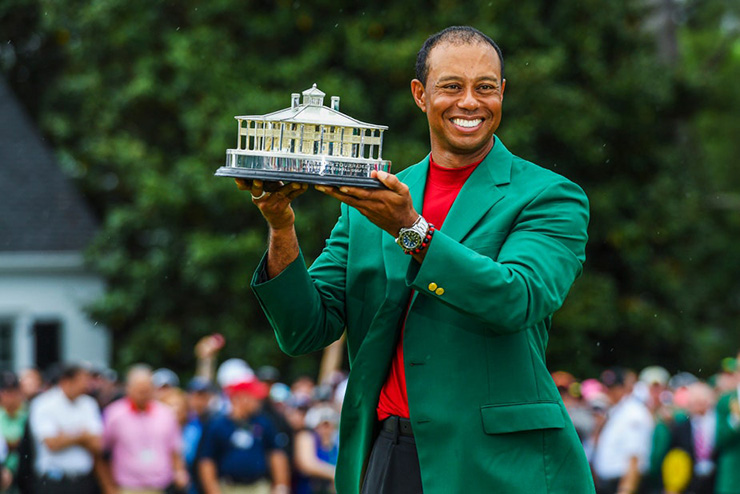
Tiger smiles after getting his fifth green jacket and the Masters trophy. (J.D. Cuban)
BROOKS KOEPKA: Eighteen is a whole lot closer than people think. … You know, you want to play against the best to ever play. You want to go toe-to-toe with them, and you know, I can leave saying I gave it my all. He’s just good, man. [Smiles.]
JACK NICKLAUS: He has another 10 years of major championships. Another 40 major championships in front of him. … I don’t want him to break my records, but I don’t want him not to be able to play and not be physically sound to play. I mean, if he’s physically sound and it’s his desire to win and he breaks it, you know, well done. That’s what it should be. That’s what sports is all about.
CURTIS STRANGE: Can he get pain-free for 10 or 14 days going into another major so that he can play well enough to win again? Who knows? It doesn’t matter to me anymore—I mean that with respect. Winning at Augusta was unbelievably good. I wasn’t sure we would see that again. I was glad he did it one more time. So it doesn’t matter if he does it again.
EILIDH BARBOUR (BBC): As the crowds were streaming out—they have to walk right past our studio on the way out—they were chanting, “Tiger! Tiger!” And that was long after he had won. It was such an “I was there” day.
JIM NANTZ: We got into the encore presentation [after the live telecast], and about 90 minutes into it, I got word [from producer Lance Barrow] that Tiger might be returning to Butler Cabin. About five minutes later, into the cabin walked Tiger and a few from his delegation, which I thought was really nice of him to do. Everybody’s still numb with what had happened. Still trying to get our minds around the historical significance of the day. And Tiger returned to the place where a little more than 90 minutes earlier he had been given another green jacket. And we had a second Butler Cabin interview with Tiger, and this one was unrushed. We had time to really get into a lot of really good detail about the week, the round, his mind-set, his family. I mean, it was extraordinary. He was exhausted, but he hung in there. In the end, it was one of the real fulfilling days for all of us there, whether we were in the gallery, whether we were there as a member of the broadcast team, watching at home, writing about it, whatever. It was just a very special day to be at Augusta, Georgia, on April the 14th, 2019.
Additional reporting by Daniel Rapaport and John Strege.

